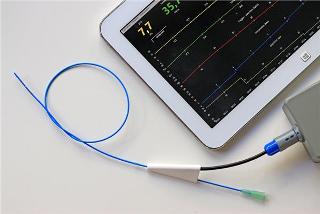May 21 2015
A new monitoring tool for preemies could help reduce complications from dangerous blood-oxygen levels by 30 to 50 percent, say its Swedish developers.
 The Neosense Technologies oxygen monitoring unit.
The Neosense Technologies oxygen monitoring unit.
Prematurely born infants need to maintain precise blood oxygen levels in order to avoid permanent damage to the brain and other organs. This requires accurate monitoring of oxygenation during the first days of life. However, existing techniques require taking blood samples — something that can be done no more than once every two hours.
With technology developed at Stockholm's KTH Royal Institute of Technology, Nils Holmström and Kenneth Danehorn have created a new, real-time monitoring system. Their system continuously measures the dissolved oxygen in neonatal blood.
They do this with an electrochemical sensor, consisting of metal surfaces that react to the oxygen content in blood. The sensor is applied on an umbilical catheter; and a chemical reaction is produced via electrical pulses generated by an electronic unit.
Danehorn says the unit can be used for a maximum of 10 days at a time.
Danehorn and Holmström formed the company, Neosense Technology, with Lars Åke Brodin, a professor of medical engineering at KTH, with the hope of bringing their technology to market by 2018.
"Our ambition is to reduce the complications as a result of insufficient oxygen control by 30 to 50 percent," Danehorn says.
Insufficient monitoring and stabilisation of oxygen levels can be dangerous for preemies. "When with severe inflammation of the stomach and intestines, infection and impaired lung function, bad blood oxygen control can be deadly," he says.
Those who survive blood oxygen deficiency in many cases suffer permanent damage to organs. Oxygenation at too high a level can cause damage to the retina, and blindness.
"If we can contribute to better monitoring and stabilisation of oxygenation supply, we hope to significantly reduce both mortality and permanent damage," Danehorn says.
In the longer term, Neosense Technologies' technology could also be used for adults in intensive care and in cardiac and vascular surgery.
Neosense Technologies collaborates with both KTH, Karolinska University Hospital and Uppsala University Hospital.
Source: https://www.kth.se/